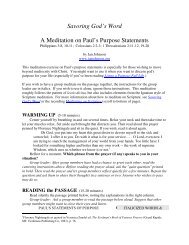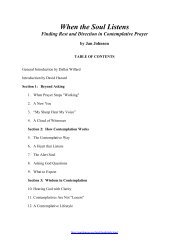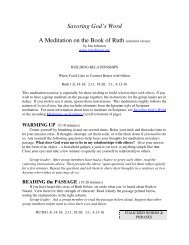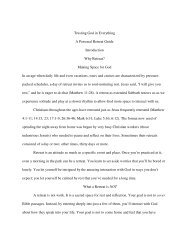FREE Download - Jan Johnson
FREE Download - Jan Johnson
FREE Download - Jan Johnson
You also want an ePaper? Increase the reach of your titles
YUMPU automatically turns print PDFs into web optimized ePapers that Google loves.
As adults, acting out children are often excitement junkies. They move from relationship to<br />
relationship without attaching. They bore quickly and don't control their impulses or wait for<br />
things. They enjoy new and changing environments so they migrate from place to place never<br />
finding home.<br />
Their typically low tolerance for frustration makes them self-destructive. Of all the children,<br />
they're most likely to become alcoholic or chemically dependent. Yet they have the best chance<br />
of working through their past issues because they didn't participate in the denial of the family.<br />
They can name their problems and seek help.<br />
THE ADJUSTER<br />
In the midst of chaos, I'll tune people out so they won't bother me.<br />
Some children get burned too many times early in life and never venture out again. They<br />
adjust their expectations because they've learned they won't get their needs met. Why try? is their<br />
motto.<br />
Adjusters usually detach from their family to become the "lost" children. In the Wells<br />
family, Cindy detaches by staying in her room and playing with her parakeet. She's also good at<br />
drawing, which is a fitting hobby because it gives her a world in which to withdraw. She can<br />
detach even in the presence of the family as she watches television and never hears the<br />
undercurrents of tension around her. To them, she is invisible.<br />
When adjusters grow up, it's difficult for them to live with other people and feel safe. They<br />
may stay uninvolved in their family. They have tuned out for so long that it's difficult to tune<br />
back in, to feel comfortable.<br />
Adjusters often reproduce their family environment and marry someone who keeps their<br />
lives in an uproar. If situations become too troubled, they do what they've always done: leave.<br />
That may mean going from marriage to marriage or from church to church or from job to job<br />
looking for a place to feel comfortable.<br />
THE PLACATER<br />
In the midst of chaos, I'll make people feel better so they'll love me.<br />
Placaters act as comforters, referees and even counselors for the family. They're hypersensitive<br />
to the feelings of other people and read people well. They try to solve problems as<br />
Gary Wells does. When Mom becomes upset with Dad, Gary listens to her complaints and then<br />
pleads Dad's case to her. His placater role has become so established that the other family<br />
members come to him with problems.<br />
Some placaters "fix" their families by getting them to laugh. This version of a placater is<br />
called the "mascot" or "family clown." When the Wells family gets particularly tense, Gary<br />
entertains his mother and sisters by coming up with ridiculous ways of taking out the kitchen<br />
garbage. If David storms out, Gary distracts his family with a funny story about school.<br />
As adults, placaters often become caretakers. They get walked on by others and they<br />
sacrifice themselves to the point that they neglect their own needs. Other people lean on<br />
placaters so hard that they often blame the placaters when things go wrong. That's what you told<br />
me to do and it didn't work! they say. The vintage placater takes the blame.








